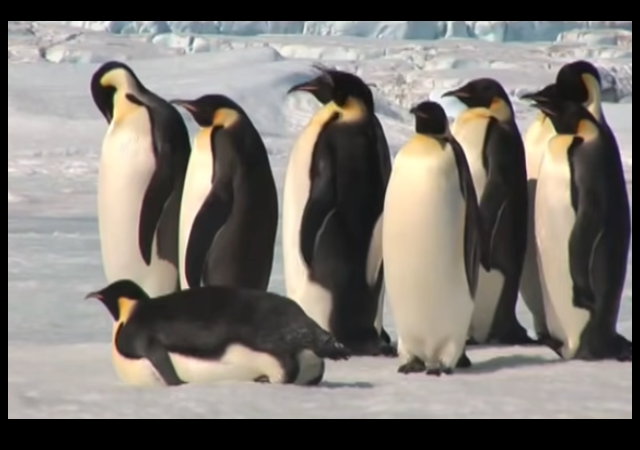Scientists Now Investigating Whether Bird Flu Has Killed Thousands of Penguins in Antarctic
Bird flu was detected in a Falkland Island penguin colony, which lost over 30 adults and hundreds of chicks.

In late January, I reported that scientists had determined that one king penguin died from bird flu in the Antarctic.
Researchers have previously raised alarm about “one of the largest ecological disasters of modern times” if bird flu reached remote Antarctic penguin populations. The birds are currently clustering together for breeding season, meaning the disease could rip through entire colonies if it continues to spread through the region.
Researchers’ fears were confirmed as hundreds of chicks and over 30 adult penguins in the South America’s Falkland Islands succumbed to the disease, now referred to as Highly Pathogenic Avian Influenza (HPAI).
A deadly type of bird flu has been found in gentoo penguins for the first time, according to the Scientific Committee on Antarctic Research (SCAR), stoking concern that the virus could spread among Antarctica’s huge penguin colonies.
Researchers found about 35 penguins dead in the Falkland Islands in the South Atlantic on Jan. 19. Samples taken from two of the dead penguins came back positive for the H5N1 avian influenza virus, said Ralph Vanstreels, a veterinarian who works with SCAR.
The Falkland Islands government told Reuters that many more gentoos were dying under similar circumstances. As of Jan. 30, “there are over 200 chicks dead alongside a handful of adults”, said government spokesperson Sally Heathman.
Now it is being reported that a scientific expedition last month found at least 532 dead Adelie penguins, with thousands more thought to have died. A team is being sent out to determine whether HPAI is the cause of death for these animals.
While the researchers suspect the deadly H5N1 bird flu virus killed the penguins, the field tests were inconclusive, the university said. Samples are being shipped off to labs that the researchers hope will provide answers in coming months.
Scientists are concerned specifically that the often fatal H5N1 influenza could decimate threatened species of penguins and other animals on the remote southern continent.
The disease has spread more aggressively in wildlife than ever before since arriving in South America in 2022 and rapidly made its way to Antarctica, where the first case of H5N1 was confirmed in February.
Finally, I would like to note that human-to-human transmission of this virus has not been documented and the cases reported in humans in this country have been mild.
It’s generally rare for people to catch any type of bird flu and human-to-human spread is even rarer.
During the current outbreak, this version of H5N1 has only been detected in a handful of humans in the last few years globally, and there aren’t any documeneted cases of human-to-human transmission.
In the Texas case, the person’s only symptom was eye redness after being exposed to cattle. It’s the second known H5N1 infection of a human in the U.S. In 2022, a poultry worker in Colorado was exposed to sick chickens and developed a mild illness.
Donations tax deductible
to the full extent allowed by law.








Comments
Any study difficult enough to involve money will happen.
NASA is launching rockets to study the eclipse, the same as they did off Wallops Island in 1970. It’s bureaucratically automatic.
From the photo, a formal diagnosis is certainly called for.
“Researchers have previously raised alarm about “one of the largest ecological disasters of modern times” if _____________”
Please fill in the blank.
Surely they wouldn’t lie to scare us.
Bwa ha ha ha ha ha ha ha ha ha ha ha!
I am, for some reason, reminded of the terrible virus that was attacking frogs all over the world some years ago. Researchers were stunned on finding it everywhere they went, and it was widely reported that death of amphibians on such a wide scale was an indication of a very dangerous situation for the planet.
Later, it was discovered that the researchers were using the same boots everywhere they went, and that they were the cause of the spread of the virus…
Frogs are doing fine now, thank you.
I am more worried about the mind viruses that are spreading in our universities.
that is easily curable
send your kids to trade school
starve the university ….
your kids will make a good living
and not be burdened down with
a hugh debt.
Bundle up, birds — it’s flu season!
(Or learn to migrate.)
That’s nature. Some birds will die and the survivors become immune.
“All penguins will be issued mail-in ballots and masks and must maintain a 6 inch distance at all times,” said the researchers.
UN announces their plan to vaccinate all of the world’s birds, followed by all animals and then fish.
A huge organization with a massive budget will of course be required, as will reparations to be paid to all third world countries (just because).
Remember the “collapse of the bee colonies” a decade ago? Bee colonies were being wiped out. Was it a bacteria? A parasite? A virus? Insecticide? All of the above?
Agriculture would be decimated. We’d have to pollenate plants by hand.
Turns out it was cyclical. There are now more bee colonies than before the die-off started. In fact, so many people started bee colonies and tax breaks instituted to support them, there are now too many.
Nature self-regulates,
Perhaps it will self-regulate the woke mind virus.